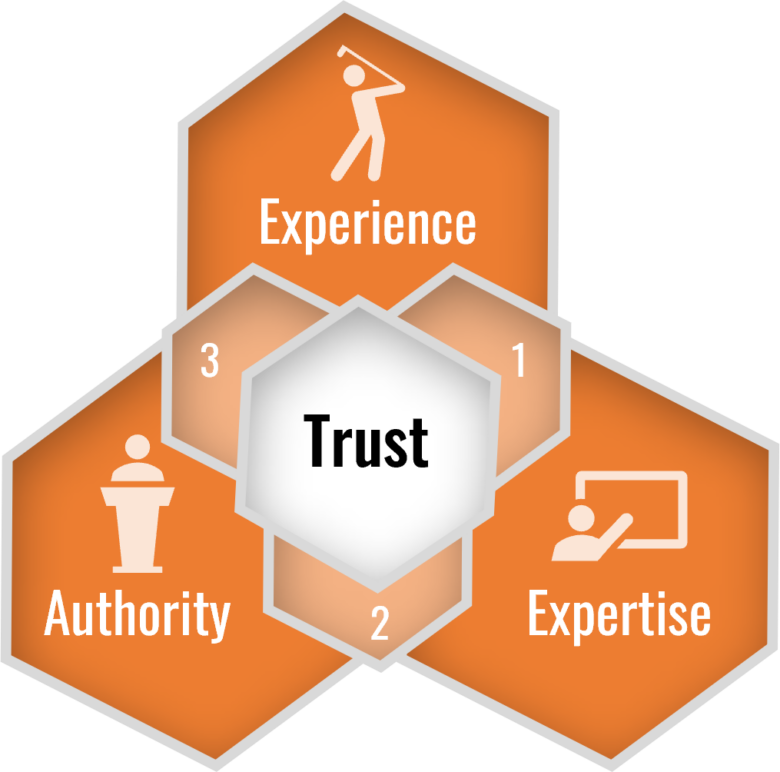What You Need To Know To Win In SEO In 2023
Search Engine Optimisation (SEO) is a bit like internal decorating.
Every year the advice changes. There are new shades and techniques you must use. What worked last year is out the window and what is required now shifts ever so slightly. Who knows what might change in three months’ time, let alone next year. It sometimes feels like its impossible to keep up.
Sound familiar?
2023 is no exception, and the changes are as subtle as usual while heading in the same direction.
Renowned marketing expert, Neil Patel, recently offered some very sound advice on the direction Google is taking, and the key to surviving endless algorithm changes,
“you have to stay ahead by focusing on your users. Do what’s best for them and you won’t have to deal with Google’s ever-changing algorithm.” Neil patel
Google is relentless in focussing on the end user. They have always stated that they want to deliver the best, most relevant and trustworthy results for every search.
So here are three things you need to know – and do – to make sure that google trust and serve your content to your prospects and customers.
Experience as well as Expertise
Beginning around 2014, Google used E-A-T to distinguish low-quality content from the high-quality content that Google is encouraging. The acronym E-A-T stands for expertise, authority, and trustworthiness. It’s not an SEO ranking factor, so much as a guideline Google gave to their quality rating team.
That is, for content to be seen as high-quality, it needs to be written in a way that demonstrates that:
- The author has significant expertise – knowledge and skills built up over time that is valuable to their audience. In other words, Google is happy when content is clearly written by experts.
- The author, together with their content, and even the publishing website, is widely regarded as an authority in their field of expertise. That is, Google are even happier when content creators are accepted as experts – a go-to source of authoritative information. This includes the website itself being seen as a leading repository of expert content.
- The author, together with their content, and even the publishing website, are seen as trustworthy. They are free from conflicts of interest, and you can act on their advice with confidence. So, Google are very happy, when content is created by the most trusted sources or experts in a given field.
So even though it is not a ranking factor, it stands to reason that high E-A-T will lead to being ranked highly.
Then in December 2022, Google added another E to the acronym. E for Experience.
This seems confusing because it doesn’t seem very far removed from the Expertise they have already included in the acronym.
Here is the difference in Google’s own words:
“Does content also demonstrate that it was produced with some degree of experience, such as with actual use of a product, having actually visited a place or communicating what a person experienced? There are some situations where really what you value most is content produced by someone who has first-hand, life experience on the topic at hand.” Google Search Central
First-hand, life experience. So, not a researcher or a third-party anecdote. Someone who has actually used the product or enjoyed the experience (or not). Someone who personally witnessed or took part in something.

As an example, I am an SEO specialist. It’s what I do. I have first-hand, real-life experience with many clients who need SEO in Hamilton New Zealand. That’s a bit different to a college student writing about SEO for an assignment – even if they have similar content. I can tell stories. I can give trustworthy advice based on the real results I have achieved for our clients.
How to incorporate Experience to boost SEO
- Stay within your area of expertise: When creating content for your webpage or article, write about things that you have first-hand, life-experience in. If you regularly bake cakes, then write about cakes. If you create nuclear fission, then feel free to write about it. But if you bake cakes, don’t write about nuclear fission.
- Tell real-life stories: Stories or case studies allow you to demonstrate how you solved a problem or overcame an obstacle. They show that you have the experience to back up your expertise. Include photos taken at the time and any comments from your colleagues, observers, or the people you were helping.
- Write a review: If you are regularly using concepts, tools, equipment, principles, or processes, write a review about your first-hand experience. Describe the context for your experience together with anything specific that has influenced your review or rating. Discuss the pros and cons, and finish with a clear recommendation that people will find easy to trust.
Topics as well as keywords
Yes, keywords are the foundation for all SEO. We know we need to create content that is relevant to the keywords that search engine users are entering.
Then is true when searchers are simply looking for something related to a keyword on its own. For example, “tap washer.” They know what it is they need and want to find the best place to purchase it nearby.
However, equally as often, searchers type in a sentence or a question like, “How to replace a tap washer.” This elevates the keyword to a topic.
Now you can write about tap washers from a broader perspective than simply what they look like and what they do. You can use natural language and synonyms of your keywords. You can be creative and provide solutions to many problems, or answers to many questions. One article can address many different issues.
And, because people frequently type in an entire sentence or question, you can ensure you match their search intent.
Most importantly though, topics allow you to demonstrate the first-hand, real-life experience you have, along with your expertise and authority on the topic. If you do this well, your audience will engage with, and recommend your content. More traffic usually results, which in turn helps to improve Google’s sense that people trust you and your content.
How to create content based on topics, not keywords
- Keep a record: The simplest thing you can do is to keep a record of the questions you get asked in your day-to-day experience. You will no doubt discover that you get asked certain questions more frequently than others. Write great content to address these common questions. Create how-to guides and other downloadable content.
- Think about search intent: Search intent is the purpose behind a keyword and the content that related to it. Use search engines to find out what is of interest to searchers. Use People Also Ask in Google Search, Answer the Public from Neil Patel, or forums related to your expertise. Engage on forums in real and meaningful ways and you will gain a good understanding of the topics that are most sought after.
- Leverage your best sellers: If you have a product that flies out the door or a service that people can’t get enough of, write about it. Make a big deal of the product features and benefits. Tell stories about your customers using them – preferably with great photos. Differentiate yourself from your competitors if you can. But also consider using inserting your less well-known products and services into your main content. You may be able to cross or up-sell people by making sure they know you have other things to offer.

Audience as well as traffic
It is always so tempting to write content simply to boost rankings or to get a backlink. And if you do this in ways that are super-helpful, authoritative, and trustworthy, then it may be ok.
But a more realistic and effective approach is to write for real people, not algorithms.
Yes, this topic overlaps a lot with the previous two, and that is intentional. Because one of the key questions Google wants you to answer is:
“Do you have an existing or intended audience for your business or site that would find the content useful if they came directly to you?” Google Search Central
If you don’t have an audience you will likely write shallow content simply to include your keywords a few times.
On the other hand, when you have a very specific audience in mind, including people you know on a first-name basis, you will write with more intent because you want them to see you as a helpful expert that they can trust and rely on.
Now, rather than stuffing keywords in, you can write naturally about the topics that interest your audience.
How to create content for people, not algorithms
- Get to know your audience: There is no substitute in business for curiosity. The best operators ask the best questions and drill down until they really know what matters to their customers. And simply, ask them what they’d like to know. This way, your content will be more relevant and detailed in the solutions your write about.
- Keep your content fresh and unique: Don’t write articles simply because your competitor does. This can be a great method, but I would rather you be unique and differentiated from your competitors. So as mentioned already, tell stories and write case studies. Do a product or service comparison to help people choose the ideal solution to their problem. Write reviews on a regular basis. Invite guests to write for you – especially guests who have different but complementary perspectives and experiences. Another way to do this is to interview your customers, sales team, other experts, and so on.
- Decide who to say no to: This one seems weird but stay with me. The way to have crystal clarity on your audience is to think about who should NOT buy your products or services. When you promote your kennel, are you wanting inquiries from farmers who own working dogs, or for townies who need a pet hotel for when they go away? Do you want spouting inquiries from people who want to do a quick DIY using PVC spouting, or do you only do continuous metal spouting? By identifying who is NOT your ideal customer you will be more relevant to those who are. So think about age and stage, gender, careers or hobbies, and gain some clarity.

Conclusion
While not an exhaustive list, these three principles will serve you well in promoting your business and website. And they work well because they have the same focus that Google has – meeting the needs and wants of the end users of your products and services. So, get to know your customers, be endlessly curious (without scaring them away), and make it clear just how your first-hand, real-life experiences can help your customers.
